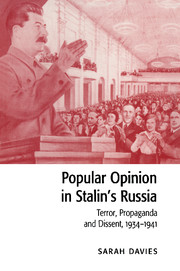Book contents
- Frontmatter
- Contents
- List of tables
- Acknowledgements
- Chronology
- List of abbreviations and archive references
- Glossary and notes on the text
- Introduction
- PART I ECONOMY AND SOCIETY
- 1 Workers, the economy, and labour policy
- 2 Peasants and the kolkhoz
- 3 Women, family policy, education
- 4 Religion and the nationalities question
- PART II POLITICS AND TERROR
- PART III THE LEADER CULT
- Conclusion
- Notes
- Bibliography
- Index
4 - Religion and the nationalities question
Published online by Cambridge University Press: 25 March 2010
- Frontmatter
- Contents
- List of tables
- Acknowledgements
- Chronology
- List of abbreviations and archive references
- Glossary and notes on the text
- Introduction
- PART I ECONOMY AND SOCIETY
- 1 Workers, the economy, and labour policy
- 2 Peasants and the kolkhoz
- 3 Women, family policy, education
- 4 Religion and the nationalities question
- PART II POLITICS AND TERROR
- PART III THE LEADER CULT
- Conclusion
- Notes
- Bibliography
- Index
Summary
The Bolsheviks were ideologically opposed to religion and nationalism, which conflicted with their own materialist, internationalist worldview, and which they wrongly assumed would eventually wither away under socialism. This chapter will show that, far from withering away, both religion and some manifestations of national sentiment remained quite prevalent into the 1930s. When this became apparent to the regime, there seems to have been a pragmatic acceptance of the need to mobilise rather than repress these feelings. Contrary to Timasheff's assertions, no outright ‘retreat’ took place, but it is clear that Russian national motifs became prominent in the propaganda of the late 1930s, with the exaltation of Pushkin, Suvorov, and other Russian heroes, and that the Orthodox church was harnessed to the Soviet cause during the ‘Great Patriotic War’.
RELIGION
Despite the propaganda of atheism and concerted attacks on the church, particularly the Russian Orthodox church – a bulwark of the tsarist regime – the party failed to wean people from the ‘opiate’ of religion, and throughout the 1920s most peasants and many workers continued to consider themselves believers. During the Cultural Revolution, a fresh onslaught against religion was launched. Religious activity was limited to registered congregations within the walls of the church, and many churches were closed. This destructive phase was followed by a new period of ‘calmer hostility’ (Hough) or even ‘ironical neutrality’ (Trotsky), as the party adopted a less aggressive stance from 1934 as part of its general policy of internal and external detente.
- Type
- Chapter
- Information
- Popular Opinion in Stalin's RussiaTerror, Propaganda and Dissent, 1934–1941, pp. 73 - 90Publisher: Cambridge University PressPrint publication year: 1997



